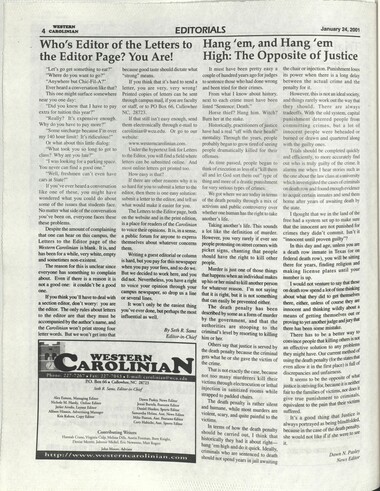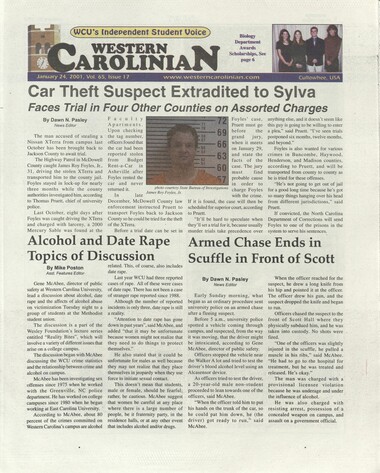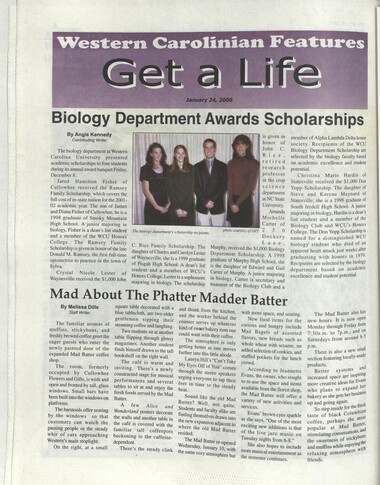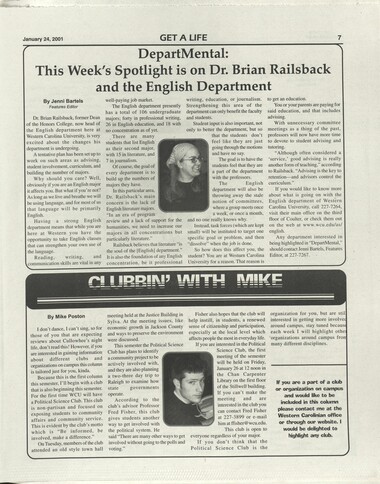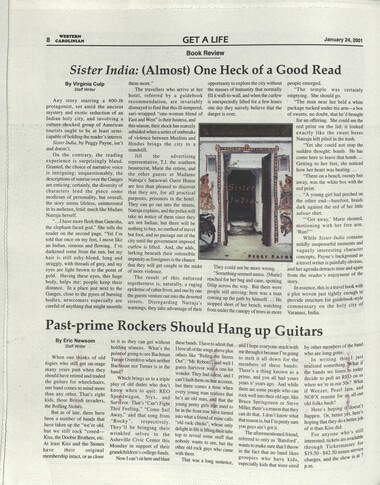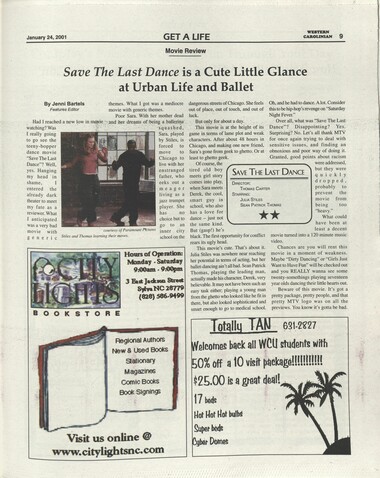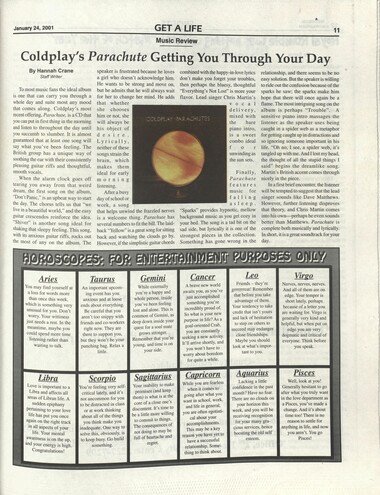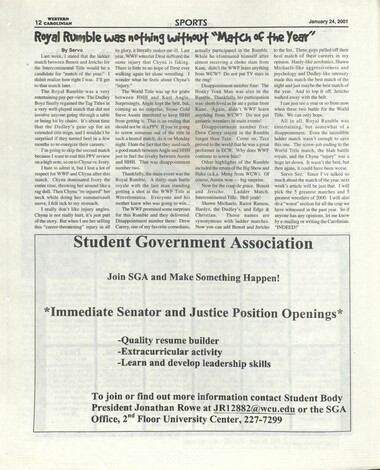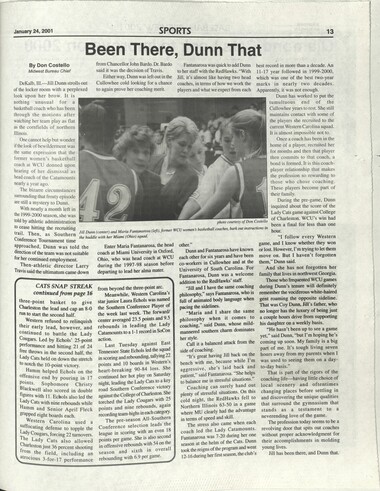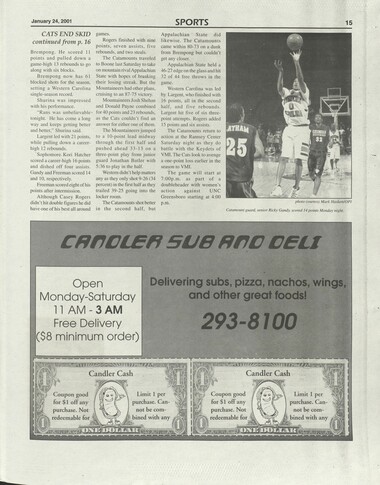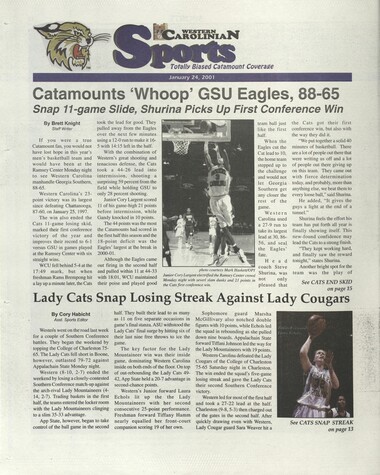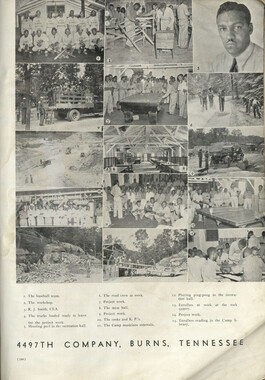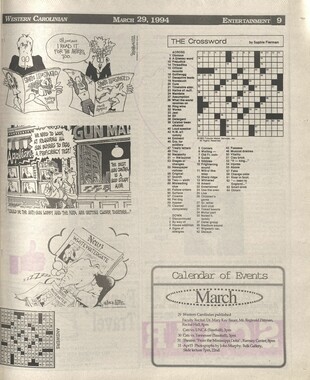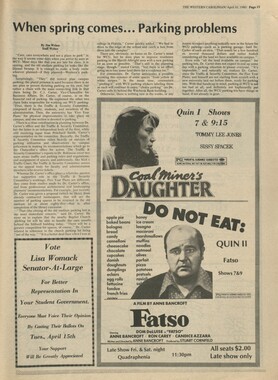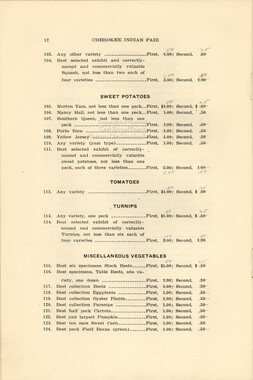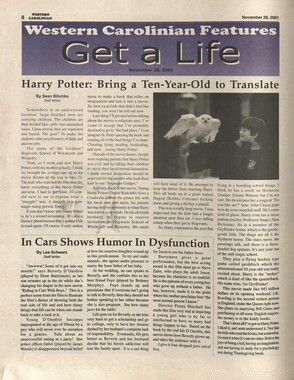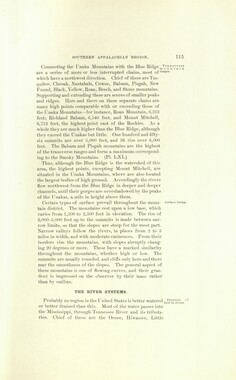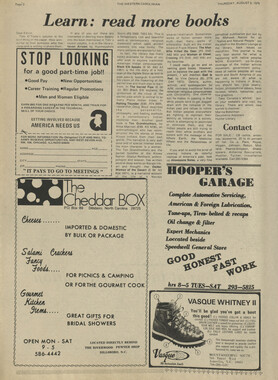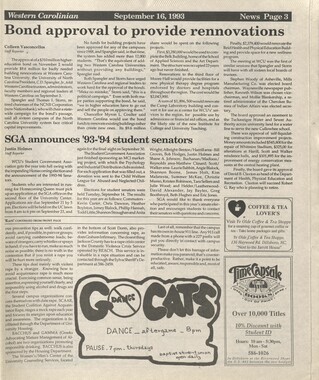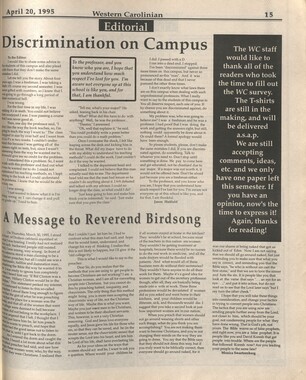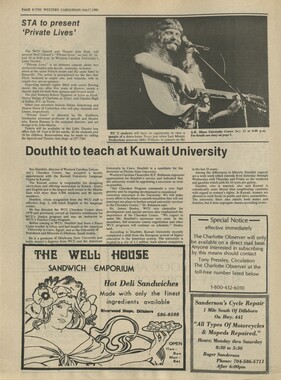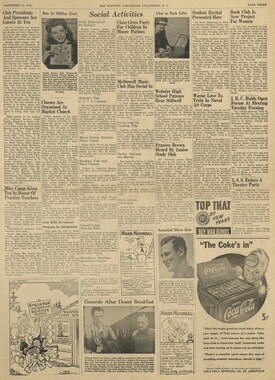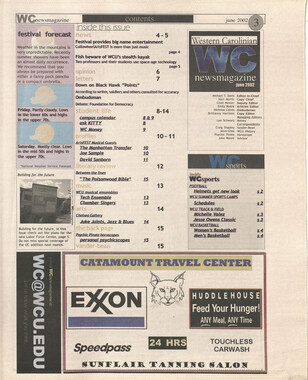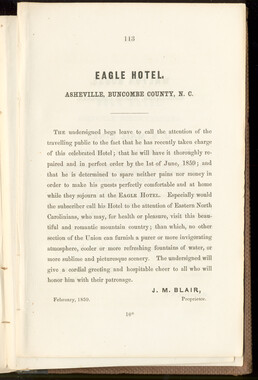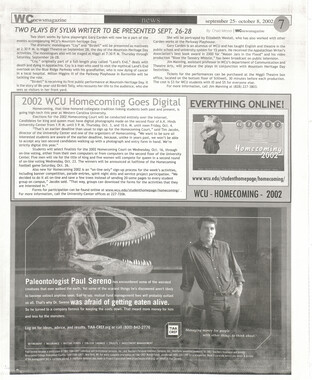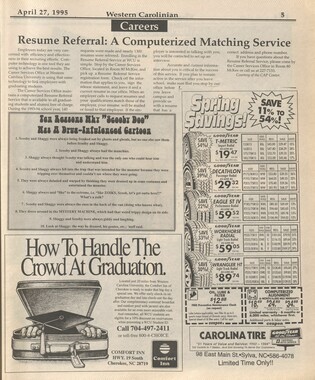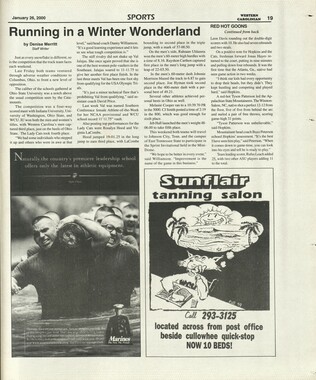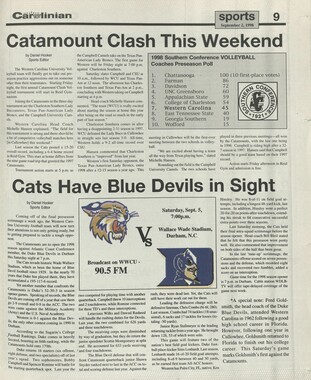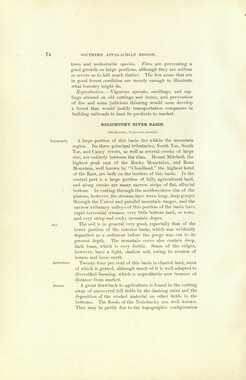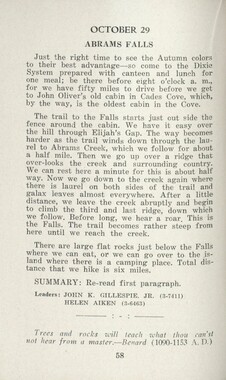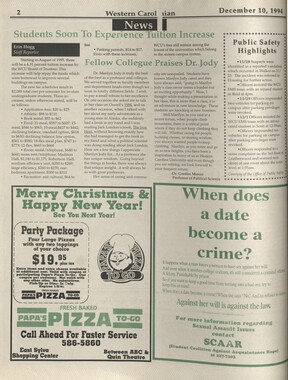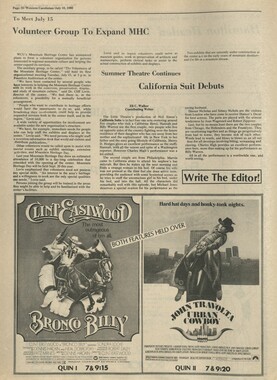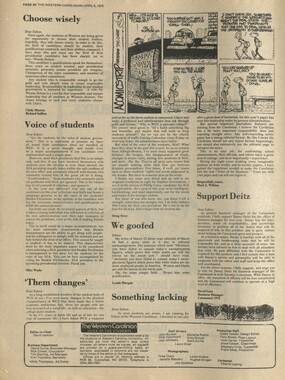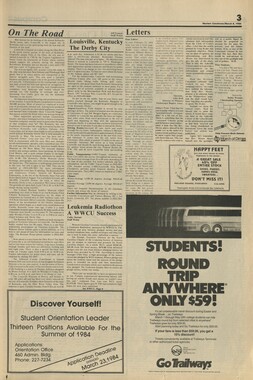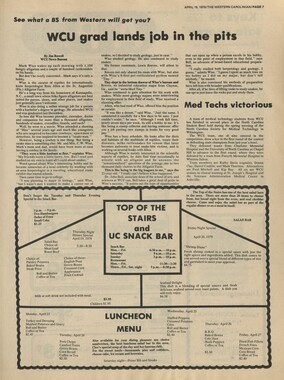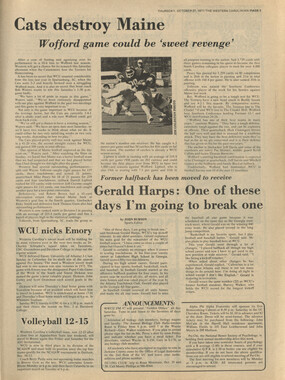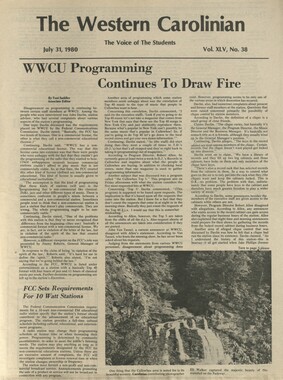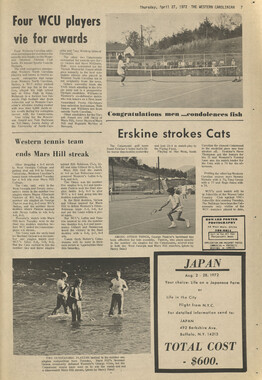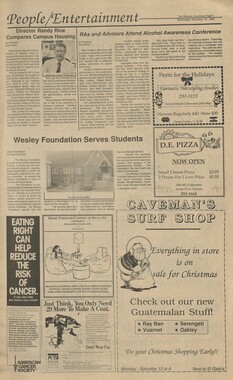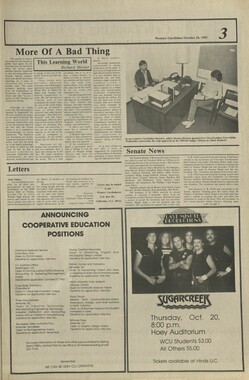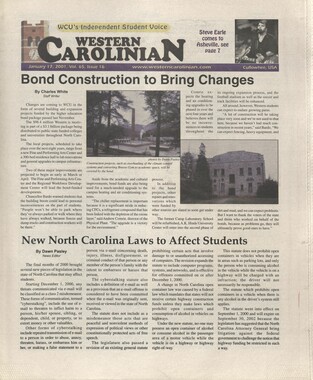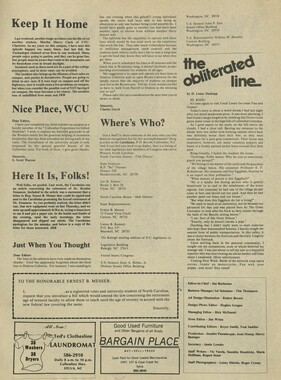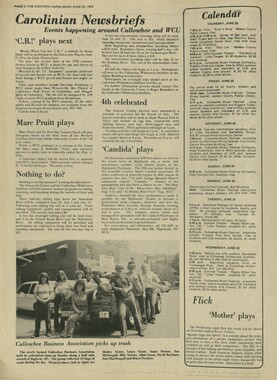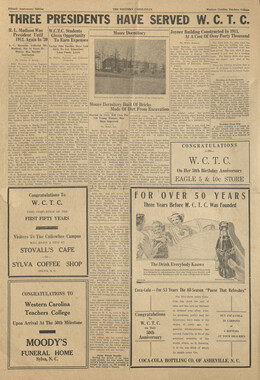Western Carolina University (20)
View all
- Canton Champion Fibre Company (2308)
- Cherokee Traditions (293)
- Civil War in Southern Appalachia (165)
- Craft Revival (1942)
- Great Smoky Mountains - A Park for America (2683)
- Highlights from Western Carolina University (430)
- Horace Kephart (941)
- Journeys Through Jackson (154)
- LGBTQIA+ Archive of Jackson County (15)
- Oral Histories of Western North Carolina (314)
- Picturing Appalachia (6679)
- Stories of Mountain Folk (413)
- Travel Western North Carolina (160)
- Western Carolina University Fine Art Museum Vitreograph Collection (129)
- Western Carolina University Herbarium (92)
- Western Carolina University: Making Memories (708)
- Western Carolina University Publications (2283)
- Western Carolina University Restricted Electronic Theses and Dissertations (146)
- Western North Carolina Regional Maps (71)
- World War II in Southern Appalachia (131)
University of North Carolina Asheville (6)
View all
- Allanstand Cottage Industries (62)
- Appalachian National Park Association (53)
- Bennett, Kelly, 1890-1974 (1295)
- Berry, Walter (76)
- Brasstown Carvers (40)
- Carver, George Washington, 1864?-1943 (26)
- Cathey, Joseph, 1803-1874 (1)
- Champion Fibre Company (233)
- Champion Paper and Fibre Company (297)
- Cherokee Indian Fair Association (16)
- Cherokee Language Program (22)
- Crowe, Amanda (40)
- Edmonston, Thomas Benton, 1842-1907 (7)
- Ensley, A. L. (Abraham Lincoln), 1865-1948 (275)
- Fromer, Irving Rhodes, 1913-1994 (70)
- George Butz (BFS 1907) (46)
- Goodrich, Frances Louisa (120)
- Grant, George Alexander, 1891-1964 (96)
- Heard, Marian Gladys (60)
- Kephart, Calvin, 1883-1969 (15)
- Kephart, Horace, 1862-1931 (313)
- Kephart, Laura, 1862-1954 (39)
- Laney, Gideon Thomas, 1889-1976 (439)
- Masa, George, 1881-1933 (61)
- McElhinney, William Julian, 1896-1953 (44)
- Niggli, Josephina, 1910-1983 (10)
- North Carolina Park Commission (105)
- Osborne, Kezia Stradley (9)
- Owens, Samuel Robert, 1918-1995 (11)
- Penland Weavers and Potters (36)
- Roberts, Vivienne (15)
- Roth, Albert, 1890-1974 (142)
- Schenck, Carl Alwin, 1868-1955 (1)
- Sherrill's Photography Studio (2565)
- Southern Highland Handicraft Guild (127)
- Southern Highlanders, Inc. (71)
- Stalcup, Jesse Bryson (46)
- Stearns, I. K. (213)
- Thompson, James Edward, 1880-1976 (226)
- United States. Indian Arts and Crafts Board (130)
- USFS (683)
- Vance, Zebulon Baird, 1830-1894 (1)
- Weaver, Zebulon, 1872-1948 (58)
- Western Carolina College (230)
- Western Carolina Teachers College (282)
- Western Carolina University (1794)
- Western Carolina University. Mountain Heritage Center (18)
- Whitman, Walt, 1819-1892 (10)
- Wilburn, Hiram Coleman, 1880-1967 (73)
- Williams, Isadora (3)
- Cain, Doreyl Ammons (0)
- Crittenden, Lorraine (0)
- Rhodes, Judy (0)
- Smith, Edward Clark (0)
- Appalachian Region, Southern (2393)
- Asheville (N.C.) (1886)
- Avery County (N.C.) (26)
- Blount County (Tenn.) (147)
- Buncombe County (N.C.) (1664)
- Cherokee County (N.C.) (283)
- Clay County (N.C.) (555)
- Graham County (N.C.) (233)
- Great Smoky Mountains National Park (N.C. and Tenn.) (478)
- Haywood County (N.C.) (3522)
- Henderson County (N.C.) (70)
- Jackson County (N.C.) (4692)
- Knox County (Tenn.) (21)
- Knoxville (Tenn.) (9)
- Lake Santeetlah (N.C.) (10)
- Macon County (N.C.) (420)
- Madison County (N.C.) (211)
- McDowell County (N.C.) (39)
- Mitchell County (N.C.) (132)
- Polk County (N.C.) (35)
- Qualla Boundary (981)
- Rutherford County (N.C.) (76)
- Swain County (N.C.) (2017)
- Transylvania County (N.C.) (247)
- Watauga County (N.C.) (12)
- Waynesville (N.C.) (68)
- Yancey County (N.C.) (72)
- Aerial Photographs (3)
- Aerial Views (60)
- Albums (books) (4)
- Articles (1)
- Artifacts (object Genre) (228)
- Biography (general Genre) (2)
- Cards (information Artifacts) (38)
- Clippings (information Artifacts) (191)
- Crafts (art Genres) (622)
- Depictions (visual Works) (21)
- Design Drawings (1)
- Drawings (visual Works) (184)
- Envelopes (73)
- Facsimiles (reproductions) (1)
- Fiction (general Genre) (4)
- Financial Records (12)
- Fliers (printed Matter) (67)
- Glass Plate Negatives (381)
- Guidebooks (2)
- Internegatives (10)
- Interviews (811)
- Land Surveys (102)
- Letters (correspondence) (1013)
- Manuscripts (documents) (619)
- Maps (documents) (159)
- Memorandums (25)
- Minutes (administrative Records) (59)
- Negatives (photographs) (5651)
- Newsletters (1285)
- Newspapers (2)
- Occupation Currency (1)
- Paintings (visual Works) (1)
- Pen And Ink Drawings (1)
- Periodicals (193)
- Personal Narratives (7)
- Photographs (12982)
- Plans (maps) (1)
- Poetry (5)
- Portraits (1654)
- Postcards (329)
- Programs (documents) (151)
- Publications (documents) (2237)
- Questionnaires (65)
- Scrapbooks (282)
- Sheet Music (1)
- Slides (photographs) (402)
- Sound Recordings (796)
- Specimens (92)
- Speeches (documents) (15)
- Tintypes (photographs) (8)
- Transcripts (322)
- Video Recordings (physical Artifacts) (23)
- Vitreographs (129)
- Text Messages (0)
- A.L. Ensley Collection (275)
- Appalachian Industrial School Records (7)
- Appalachian National Park Association Records (336)
- Axley-Meroney Collection (2)
- Bayard Wootten Photograph Collection (20)
- Bethel Rural Community Organization Collection (7)
- Blumer Collection (5)
- C.W. Slagle Collection (20)
- Canton Area Historical Museum (2110)
- Carlos C. Campbell Collection (198)
- Cataloochee History Project (65)
- Cherokee Studies Collection (4)
- Daisy Dame Photograph Album (5)
- Daniel Boone VI Collection (1)
- Doris Ulmann Photograph Collection (112)
- Elizabeth H. Lasley Collection (1)
- Elizabeth Woolworth Szold Fleharty Collection (4)
- Frank Fry Collection (95)
- George Masa Collection (173)
- Gideon Laney Collection (452)
- Hazel Scarborough Collection (2)
- Hiram C. Wilburn Papers (28)
- Historic Photographs Collection (236)
- Horace Kephart Collection (861)
- Humbard Collection (33)
- Hunter and Weaver Families Collection (1)
- I. D. Blumenthal Collection (4)
- Isadora Williams Collection (4)
- Jesse Bryson Stalcup Collection (47)
- Jim Thompson Collection (224)
- John B. Battle Collection (7)
- John C. Campbell Folk School Records (80)
- John Parris Collection (6)
- Judaculla Rock project (2)
- Kelly Bennett Collection (1314)
- Love Family Papers (11)
- Major Wiley Parris Civil War Letters (3)
- Map Collection (12)
- McFee-Misemer Civil War Letters (34)
- Mountain Heritage Center Collection (4)
- Norburn - Robertson - Thomson Families Collection (44)
- Pauline Hood Collection (7)
- Pre-Guild Collection (2)
- Qualla Arts and Crafts Mutual Collection (12)
- R.A. Romanes Collection (681)
- Rosser H. Taylor Collection (1)
- Samuel Robert Owens Collection (94)
- Sara Madison Collection (144)
- Sherrill Studio Photo Collection (2558)
- Smoky Mountains Hiking Club Collection (616)
- Stories of Mountain Folk - Radio Programs (374)
- The Reporter, Western Carolina University (510)
- Venoy and Elizabeth Reed Collection (16)
- WCU Gender and Sexuality Oral History Project (32)
- WCU Mountain Heritage Center Oral Histories (25)
- WCU Oral History Collection - Mountain People, Mountain Lives (71)
- WCU Students Newspapers Collection (1744)
- Western North Carolina Tomorrow Black Oral History Project (69)
- William Williams Stringfield Collection (2)
- Zebulon Weaver Collection (109)
- African Americans (388)
- Appalachian Trail (32)
- Artisans (521)
- Cherokee art (84)
- Cherokee artists -- North Carolina (10)
- Cherokee language (21)
- Cherokee pottery (101)
- Cherokee women (208)
- Church buildings (166)
- Civilian Conservation Corps (U.S.) (110)
- College student newspapers and periodicals (1830)
- Dams (94)
- Dance (1023)
- Education (222)
- Floods (60)
- Folk music (1015)
- Forced removal, 1813-1903 (2)
- Forest conservation (220)
- Forests and forestry (905)
- Gender nonconformity (4)
- Great Smoky Mountains National Park (N.C. and Tenn.) (154)
- Hunting (38)
- Landscape photography (10)
- Logging (103)
- Maps (84)
- Mines and mineral resources (8)
- North Carolina -- Maps (18)
- Paper industry (38)
- Postcards (255)
- Pottery (135)
- Railroad trains (69)
- Rural electrification -- North Carolina, Western (3)
- School integration -- Southern States (2)
- Segregation -- North Carolina, Western (5)
- Slavery (5)
- Sports (452)
- Storytelling (245)
- Waterfalls -- Great Smoky Mountains (N.C. and Tenn.) (66)
- Weaving -- Appalachian Region, Southern (280)
- Wood-carving -- Appalachian Region, Southern (328)
- World War, 1939-1945 (173)
Western Carolinian Volume 65 (66) Number 17
Item
Item’s are ‘child’ level descriptions to ‘parent’ objects, (e.g. one page of a whole book).
-
-
WESTERN CAROLINIAN EDITORIALS January 24,2001 Who's Editor of the Letters to the Editor Page? You Are! "Let's go get something to eat?" "Where do you want to go?" "Anywhere but Chic-Fil-A?" Ever heard a conversation like that? This one might surface somewhere near you one day: "Did you know that I have to pay extra for tuition this year?" "Really? It's expensive enough. Why do you have to pay more?" "Some surcharge because I'm over my 140 hour limit! It's ridiculous!" Or what about this little dialog: "What took you so long to get to class? Why are you late?" "I was looking for a parking space. You never can find a good one." "Well, freshmen can't even have cars at State!" If you've ever heard a conversation like one of these, you might have wondered what you could do about some of the issues that students face. No matter what side of the conversation you've been on, everyone faces these these problems. Despite the amount of complaining that one can hear on this campus, the Letters to the Editor page of the Western Carolinian is blank. It is, and has been for a while, very white, empty and sometimes non-existent. The reason for this is unclear since everyone has something to complain about. Even if there is a reason it is not a good one: it couldn't be a good one. If you think you'll have to deal with a section editor, don't worry: you are the editor. The only rules about letters to the editor are that they must be accompanied by the author's name, and the Carolinian won't print strong four letter words. But we won't get into that because good taste should dictate what "strong" means. If you think that it's hard to send a letter, you are very, very wrong! Printed copies of letters can be sent through campus mail, if you are faculty or staff, or to PO Box 66, Cullowhee NC, 28723. If that still isn't easy enough, send them electronically through e-mail to carolinian@wcu.edu. Or go to our website: www.westerncarolinian.com. Under the hypertext link for Letters to the Editor, you will find a field where letters can be submitted online. And most online letters get printed too. How easy is that? If there are other reasons why it is so hard for you to submit a letter to the editor, then there is one easy solution: submit a letter to the editor, and tell us what would make it easier for you. The Letters to the Editor page, both on the website and in the print edition, is a place for readers of the Carolinian to voice their opinions. It is, in a sense, a public forum for anyone to express themselves about whatever concerns them. Writing a guest editorial or column is hard, but you pay for this newspaper when you pay your fees, and so do we. But we decided to work here, and you did not. Nevertheless, you have a right to voice your opinion through your campus newspaper, so drop us a line or several lines. It won't only be the easiest thing you' ve ever done, but perhaps the most influential as well. By Seth R. Sams Editor-in-Chief Hang 'em, and Hang 'em High: The Opposite of Justice RO. Box 66 • Cullowhee, NC 28723 Seth R. Sams, Editor-in-Chief Alex Esmon, Managing Editor Nichole M. Hardy, Online Editor Javier Arvclo, Layout Editor Allison Hinson, Advertising Manager Kris Kehres, Copy Editor Dawn Pasley, News Editor Jenni Bartels, Features Editor Daniel Hooker, Sports Editor Samantha Helms, Asst. News Editor Mike Poston, Asst. Features Editor Cory Habicht, Asst. Sports Editor Contributing Writers Hannah Crane, Virginia Culp, Melissa Dills, Austin Freeman, Brett Knight, Denise Merrirt, Johnnie Mickel, Eric Ncwsomc, Matt Rogers John Moore, Advisor h t 11"> : / / w w w.' It must have been pretty easy a couple of hundred years ago forjudges to sentence those who had done wrong and been tried for their crimes. From what I know about history, next to each crime must have been listed "Sentence: Death." Horse thief? Hang him. Witch? Burn her at the stake. Historically, practitioners of justice have had a real "off with their heads" mentality. Through the years, people probably began to grow tired of seeing people dramatically killed for their offenses. As time passed, people began to think of execution as less of a "kill them all and let God sort them out" type of thing and more of a drastic punishment for very serious types of crimes. We got where we are today in terms of the death penalty through a mix of activism and public controversy over whether one human has the right to take another's life. Taking another's life. This sounds a lot like the definition of murder. However, you very rarely if ever see people protesting on street corners with picket signs, chanting that people should have the right to kill other people. Murder is just one of those things that happens when an individual makes up his or her mind to kill another person for whatever reason. I'm not saying that it is right, but it is not something that can easily be prevented either. The death penalty has been described by some as a form of murder by the government, and that the authorities are stooping to the criminal's level by resorting to killing him or her. Others say that justice is served by the death penalty because the criminal gets what he or she gave the victim of the crime. That is not exactly the case, because not too many murderers kill their victims through electrocution or lethal injection in sanitized rooms while strapped to padded chairs. The death penalty is rather silent and humane, while most murders are violent, scary, and quite painful to the victims. In terms of how the death penalty should be carried out, I think that historically they had it about right- hang 'em high and do it quick. Ideally, criminals who are sentenced to death should not spend years in jail awaiting the chair or injection. Punishment loses its power when there is a long delay between the actual crime and the penalty for it. However, this is not an ideal society, and things rarely work out the way that they should. There are always tradeoffs. With the old system, capital punishment deterred people from committing crimes, but a lot of innocent people were beheaded or burned or drawn and quartered along with the guilty ones. Trials should be completed quickly and efficiently, to more accurately find out who is truly guilty of the crime. It alarms me when I hear stories such as the one about the law class at a university which investigated the cases of criminals on death row and found enough evidence to acquit certain inmates and send them home (An years of awaiting death by the state. I thought that we in the land of the free had a system set up to make sure that the innocent are not punished for crimes they didn't commit. Isn't it "innocent until proven guilty"? In this day and age, unless you are a death row inmate in Texas (or on federal death row), you will be sitting there for years, finding religion and making license plates until your number is up. I would not venture to say that those on death row spend a lot of time thinking about what they did to get themselves there, either, unless of course they are innocent and thinking wildly about a means of getting themselves out or proving to yet another judge and jury that there has been some mistake. There has to be a better way to convince people that killing others is not an effective solution to any Probl*mS they might have. Our current method1 o using the death penalty (for the states that even allow it in the first place) is full ° discrepancies and unfairness. It seems to be the opposite of wM justice is striving for, because it is neitn i fair to the families of victims, nor doe give true punishment to ™min*l_ equivalent to the pain that their vie suffered . jS It's a good thing thaUu^ always portrayed as being b,,ndt01"^ because in the case of the death pena* she would not like if if she were to ** it. DawnN.P^ Sews Editor
Object
Object’s are ‘parent’ level descriptions to ‘children’ items, (e.g. a book with pages).
-
The Western Carolinian is Western Carolina University's student-run newspaper. The paper was published as the Cullowhee Yodel from 1924 to 1931 before changing its name to The Western Carolinian in 1933.
-
